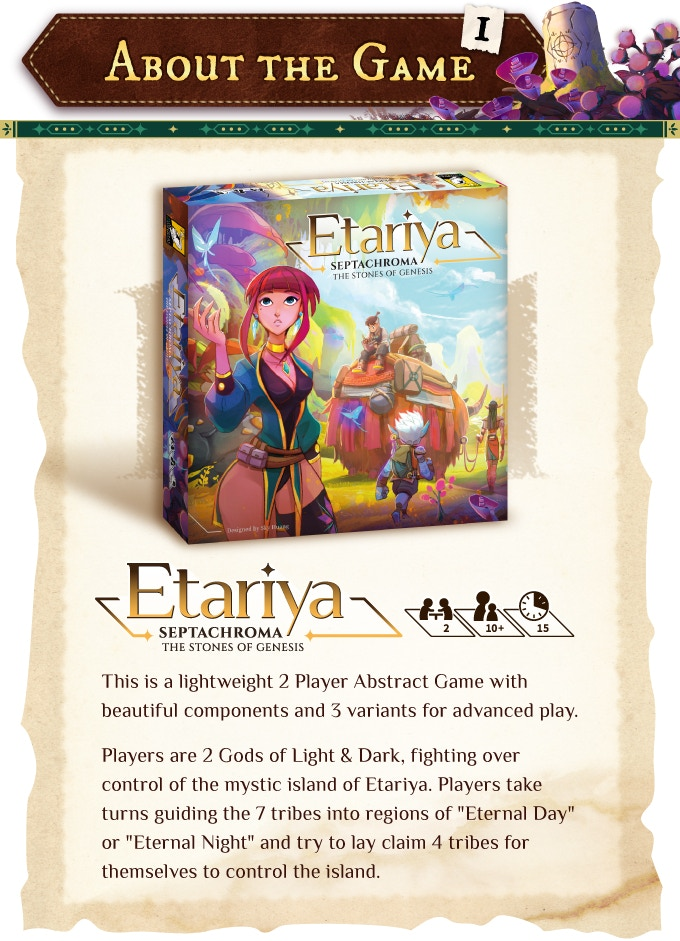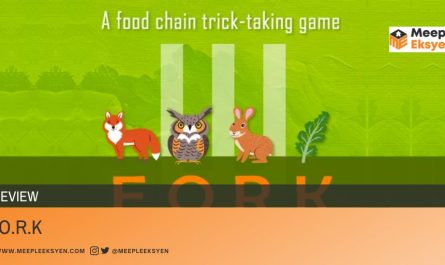Moaidea Game Design is venturing into uncharted territory by developing a brand-new intellectual property for their upcoming games. The universe currently in commission is a major undertaking under the name Project Etariya. Through their latest release last year, they are giving players a glimpse of this impending venture. Their first game is set on a mystical island of the same name, which could potentially serve as the backdrop for future titles in this exciting new universe.
Securing their first footing with The Septachroma Stones of Genesis, Etariya is a two-player abstract game that pits them into the undying rivalry of the Gods of Light and Dark. The game revolves around leading seven tribes, either towards the eternal day or night. The game’s intriguing and solid premise, along with the strong thematic foundation, makes it worth exploring further to see how well the gameplay mechanics and thematic elements integrate.
Opinion
Etariya’s concise rulebook is a breeze to read. It’s easy to understand the whole concept of the game from the first reading. Moaidea Game Design has done an excellent job of fusing the technicality of the gameplay with the background story of the entire universe in a single stroke of writing.
For instance, the rules dictate that one player takes control of the dark overlay while the other takes the light one. This conception is layered with the depiction of the mysterious island of Etariya itself. In short, the rulebook is not merely for practical matters. It becomes a great narrative, serving as a storytelling medium for players to peek into the universe that Moaidea Game Design is currently cooking up.

Overall, the rulebook is short, thanks to the simple gameplay. Yet, it is rich in detail depiction of the background story domain. They cover the complete prelude, making it a joy of literacy as well. Thus, it successfully provides players with a clear understanding of the game’s mechanics and the universe it’s set in.
What makes Etariya able to compete in the two-player market segment? The simplicity. Thanks to its abstract nature, Etariya could easily capture without being overly complicated. It doesn’t take long to set up and play. And its concept is just as straightforward: Players place the three Tribe Stones drawn from the bag onto the Island Board, following a sort of chaining rule. The stones can only be placed adjacent to the stone of the same colour, whenever possible, creating a continuous string of tribe.
Of course, it is in our best interest to place this tribe on the overlay, which corresponds to the god we are playing with. This is simple, yet restricting rule creates a feeling of continuity, as if we’re crafting a chain of events that will decide the fate of the folks inhabiting the mystical island.
It’s a competition to control the tribe majority, but far from the conventional sense. The rule subjects us not to manipulate the preponderance in the tribe directly. Instead, we’re vying for area majority, which adds an interesting twist to the gameplay. The stone would land either in the dark or light overlay, which then decide to which God this tribe pledges their loyalty. Strategic placement is key, as it can block the other God’s movement and force them to make unfavourable moves. Which, in the most ideal case, it then leads them to losing the tribe majority.
Etariya’s gameplay leans more to the tactical spectrum than strategic in nature. At least for its default rule. While some experienced gamers may find the idea of random occurrences a pet-peeve, it’s a necessary evil to maintain balance in the game. Luck plays a significant role in determining the course of the game, particularly with the three Tribe Stones drawn from the bag in the mid-to-late game. These stones become crucial to securing victory, whereas their impact is less felt in the early game, as most overlays remain open.
The first two variants of Etariya are particularly intriguing as they address and tackle the issue of randomness to some extent. The result: a more strategic approach to the game. Although the Tribe stones are still randomly drawn, these variants provide players with open-information and the ability to choose which stones to place on the board during their turn. After playing with these variants, the default gameplay can feel somewhat basic in comparison. A tutorial session at best.
Despite its strengths, Etariya is not without flaws. Sharing the same unfortunate fate with any other abstract game, its gameplay mechanics can feel disconnected from the game’s already beautifully crafted universe and background story. While the battle between light and dark is undoubtedly present throughout the game, it may not be enough to truly connect these two ends. Some seasoned players may find this aspect lacking. And since the tie between the two aspects is not impactful enough, it’s easy to do reskins for Etariya.
Fazit
Etariya is a small, yet challenging game designed for two players. With the default setting emphasizing tactical manoeuvres, the addition of variants is a nice touch to push the game to a more strategic approach. I hold the simplicity in high regard, too. It has the potential to win over a broader audience. Despite the absence of cohesive connection between the gameplay and mechanics to the thematic touch, it would be a sin not to appreciate the beautifully created universe of Etariya. I am waiting for their next, more immersive game within this same milieu.
The Kickstarter project will be launching on 24/04/2023.
Do you love board games as much as we do? Support us!
Thank you for reading our articles! If you enjoyed our work and want more captivating board game contents, make sure to:
👉 Follow us on our social media — you can find us on ![]()
![]()
![]() Click one of the icons to land on our social media, or find us @meepleeksyen there, it’s just a click away! Stay updated with our latest board game reviews and previews by following us on those platforms 📱👍
Click one of the icons to land on our social media, or find us @meepleeksyen there, it’s just a click away! Stay updated with our latest board game reviews and previews by following us on those platforms 📱👍
💬 Do you have contrasting opinions? Leave a comment — share your thoughts with us, we’d love to hear (or read) yours! Have you played this game before? Did you have something similar as well? Or perhaps, something more personal, like what are your favourite board games? Let’s discuss in the comments below!
🙏 Support Us! Your generous support can help us produce even better content in the future. If you love what we do, consider making a donation to our blog. Every contribution counts and means a lot to us! You can either donate locally with Indonesian Rupiah (IDR) via Trakteer ![]() or for international readers with another currency through Buy Me a Coffee
or for international readers with another currency through Buy Me a Coffee ![]() It helps us to survive, too! 💰 Click one of the button below 👇
It helps us to survive, too! 💰 Click one of the button below 👇
I am a full-time food technologist during weekdays. However, when the calendar hits weekends, I transform into an avid board gamer. I am a hardcore Legend of the Five Rings (L5R) LCG player from Fantasy Flight Games (FFG). Current hobby: buying board games. My shelf of shame’s list is getting longer, thanks to you, Kickstarter.





